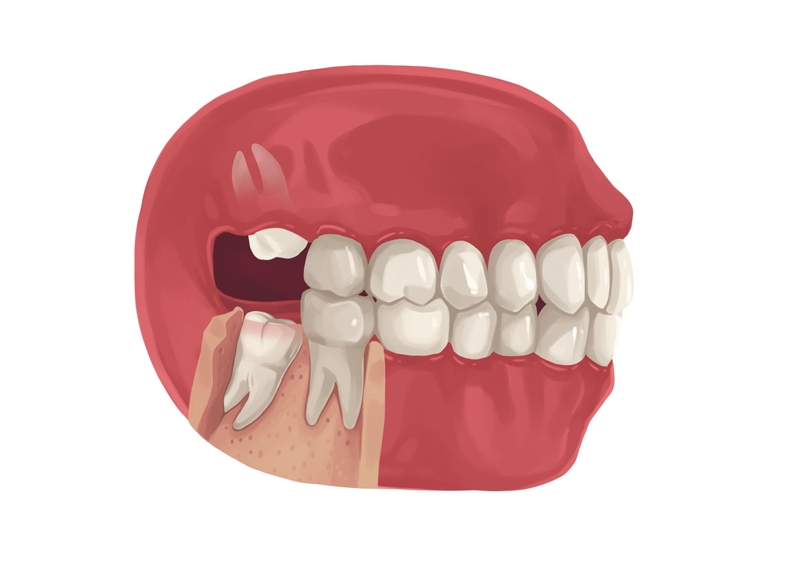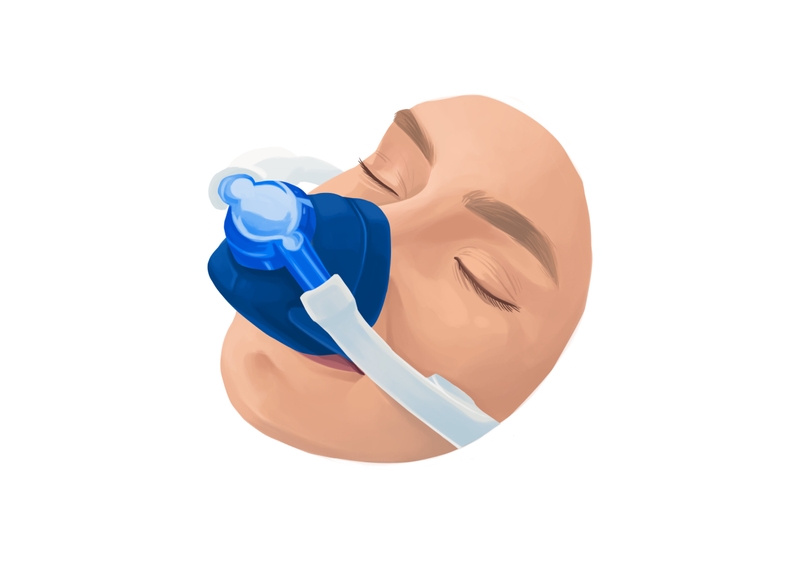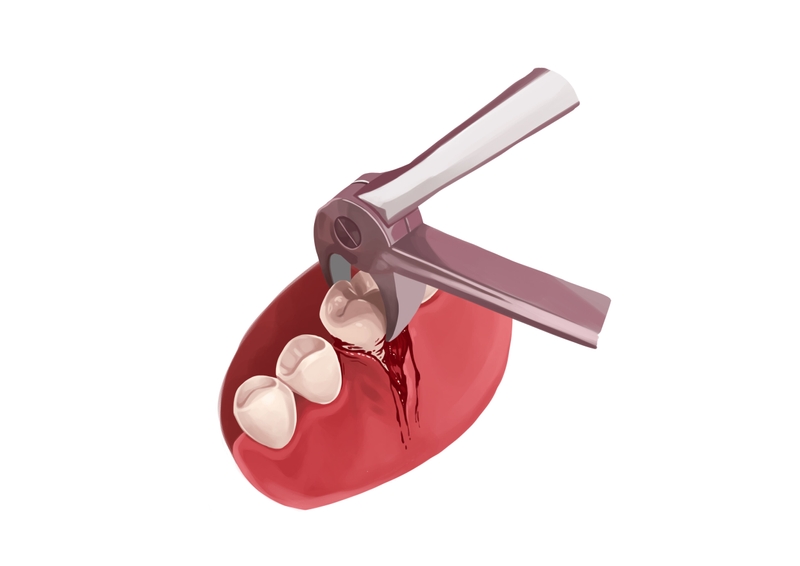- The average cost of wisdom tooth removal is $550, but can be higher if complications arise.The cost of wisdom tooth extraction depends on the type and position of the tooth.
- Additional procedures during the extraction, such as dental exams and sedation, can increase the cost.
- Dental insurance can cover up to 80% of the cost of wisdom tooth removal, but annual maximums and other limitations may apply.
Use Authority Dental to book affordable dentists near you and save big on all dental procedures, including extractions.
Wisdom tooth removal is a very common procedure, with around 70% of privately insured patients having at least one extraction by age 60. But how much does wisdom tooth removal really cost? Here's everything you need to know.
Average wisdom tooth extraction cost without insurance

Picture by Authority Dental under CC 2.0 license
The state of the wisdom tooth, or “third molar” and its position in the jaw is the most important factor in determining how much the extraction procedure will cost.
| WISDOM TEETH TYPE | AVERAGE COST | COST RANGE |
|---|---|---|
| Erupted | $300 | $200-$700 |
| Impacted, under soft tissue | $350 | $250-$850 |
| Impacted, partially bony | $450 | $300-$950 |
| Impacted, fully bony | $550 | $350-$1,100 |
The cost of wisdom tooth removal is lower if the third molar is fully erupted, varying between $200 and $700. In this case, the extraction can be relatively simple.
The cost of impacted wisdom tooth removal is usually higher, sometimes reaching up to $1,100 for the most complex conditions like fully bony impacted teeth. Such procedures require surgical attention, which incurs greater expenses.
The prices might be higher if you ignore symptoms of a troublesome wisdom tooth. You may even need an appointment with a maxillofacial surgeon to solve the problem as soon as possible.
And depending on your dental insurance, you can always talk to your dental office to see if there are any payment plans that might help you save a few dollars from any possible additional cost from your wisdom tooth removal.
Associated costs of widom tooth extraction

Picture by Authority Dental under CC 2.0 license
Some of these procedures during the wisdom teeth extraction will be necessary and they will generate additional costs.
| PROCEDURE | AVERAGE COST | COST RANGE |
|---|---|---|
| Dental exam | $100 | $50-$200 |
| Panoramic X-ray | $130 | $100-$250 |
| Periapical X-ray | $35 | $25-$50 |
| Cone beam CT | $330 | $150-$750 |
| Moderate sedation | $250 | $100-$500 |
| Deep sedation | $270 | $150-$450 |
Your dentist will make the final decision about which must be performed in your case.
Dental exam
The first fee you will come across is the price for the dental exam, which is $100 on average.During this appointment, the dentist will assess your overall oral health issues, adjacent teeth, the state of your gum tissue, and whether you need an extraction of wisdom teeth at all. He or she will also determine which type of impaction is relevant.
You should inform the dental professional of any discomfort or pain you are feeling, medication you are taking, and the level of sedation you would like.
The dental exam is the time to ask any questions you may have about the surgery. You will also be informed about what you should and shouldn't do before and after your visit.
Dental X-rays
You can expect to pay for an X-ray that covers one or two teeth, or the whole structure of the mouth. Wisdom tooth extraction often involves surgery, and it is vital to know what the internal structures involved look like.
There are different types of dental radiographs, but before an extraction, you might have one of the following:
a panoramic X-ray,
a periapical X-ray, or
a cone-beam CT.
Among them, the most affordable is the periapical X-ray, which costs $35 on average. Cone beam CT is at the higher end, with a price between $150 and $750.
Anesthesia
You will definitely need some anesthesia for wisdom teeth removal. The most common types are:
local anesthetic - included in the price of your procedure, the least invasive form,
nitrous oxide - “laughing gas”, inhaled through a mask, very expensive,
conscious sedation - orally administered before the procedure, also costly,
intravenous sedation - a sedative delivered through a vein throughout the procedure, the cost of which is difficult to determine beforehand, or
general anesthesia - the most expensive type, makes you totally unconscious.
There are several factors that help determine what type of anesthesia will be used. Those include your pain tolerance, how you handle dental surgery, and the level of complexity of the wisdom tooth. Although local anaesthesia may not always be enough to block discomfort, wisdom tooth removal without sedation is possible and sometimes even recommended for health reasons.
The dentist will be making the final decision.
Does insurance cover wisdom tooth removal?

Picture by Authority Dental under CC 2.0 license
Wisdom tooth removal without insurance can mean high out-of-pocket costs. Normally, an average dental insurance plan might cover up to 80% of the costs of wisdom tooth removal.
You have to remember, though, that insurance policies have annual maximums. This usually means that it won’t cover any more expenses throughout the year. And if you need more than one tooth extracted you will have to drag the process out over several years.
The option we recommend is going with a dental discount plan. Those can be used with insurance after your limit is reached or independently. You have to pay a monthly or yearly fee. In return, you get reductions reaching 10%-60% on all dental procedures.
There are no yearly limits or paperwork that you have to deal with as in the case of insurance. The procedures don’t have to be medically necessary either. Plans cover all types of treatment, including the purely cosmetic kind.
FAQ
How much does it cost to remove 4 wisdom teeth?
How much does wisdom teeth removal cost with general anesthesia?
Why is wisdom tooth extraction expensive?
Wisdom tooth extractions are often complicated. An erupted one might be removed by a general dentist and that often costs a lot less.
If the tooth is impacted, which is common with this category of teeth, an oral surgeon might have to perform the removal. Such a procedure means a deeper form of sedation, which is charged extra. This drives the price up considerably.
Is it cheaper to get all wisdom teeth out at once?
Some dental offices offer to take several teeth out at the same time. This is usually possible if your top and bottom teeth on the same side are both ready for removal.
Such a package deal can help you save on the costs of anesthesia, initial evaluation, X-rays, child and pet care, and the ride home if assisted by someone else. The procedure itself will probably cost as it normally would per tooth.
Henry Hackney, DMD
Almost all dental insurance plans cover third molar removal. If it is determined to be medically necessary (which I could argue it almost always is), simple medical insurance may cover it as well.